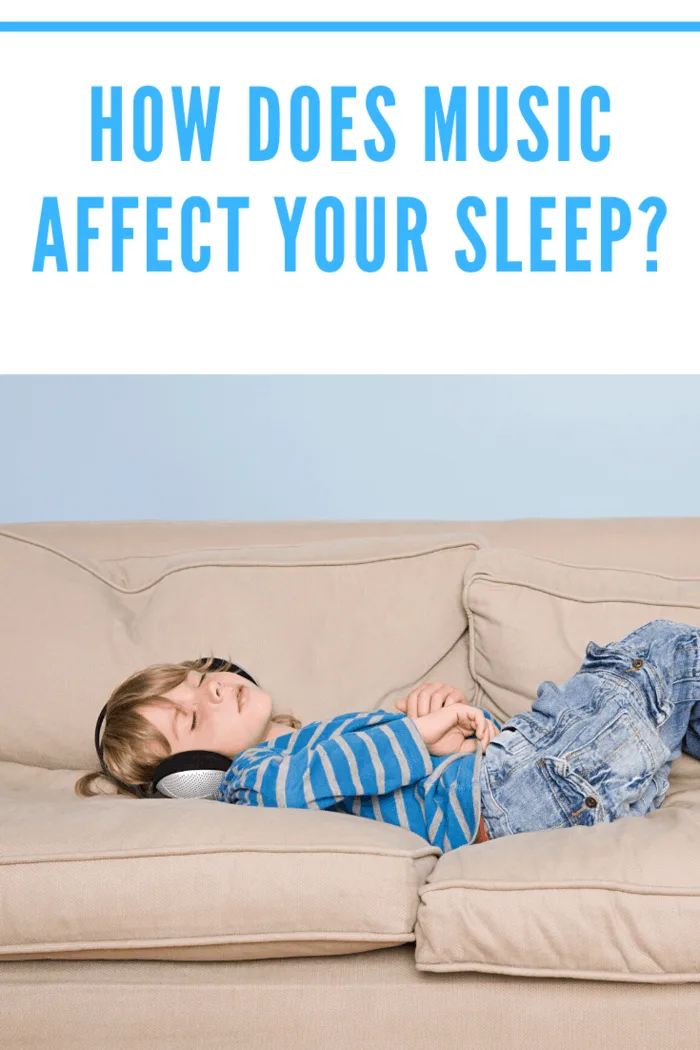Music has long been recognized as a powerful medium that can evoke emotions, uplift spirits, and transport us to different states of mind. Beyond its ability to entertain and move us, music also holds the potential to impact our physical and mental well-being, including our sleep. The relationship between music and sleep has garnered increasing attention from researchers and sleep enthusiasts alike, with studies delving into the effects of music on sleep quality, relaxation, and overall sleep experience. Understanding how music influences our sleep patterns can provide valuable insights into optimizing our nighttime routines and enhancing our restorative rest. In this article, we will explore the fascinating ways in which music affects sleep, uncovering the scientific evidence and practical implications for harnessing the power of music to promote a more restful and rejuvenating slumber.
Music helps you sleep, and although it depends on the type of music you choose, music has proven effects on your physical well-being and sleep patterns.
How Does Music Affect your Sleep?
The good news is that there is a wide range of gadgets to listen to music while in bed, so if you are an insomniac or light sleeper, you can find an easy solution that will leave you feeling alert and refreshed each morning.
Music affects sleep in several ways, exerting both physiological and psychological influences that can impact the quality and depth of our rest.
Here are some key ways in which music affects sleep:
- Relaxation and Stress Reduction: Music has the ability to induce a sense of relaxation and calmness, helping to alleviate stress and anxiety that may interfere with sleep. Slow-tempo music with soothing melodies and gentle rhythms can activate the parasympathetic nervous system, promoting a state of relaxation and facilitating the transition into sleep.
- Sleep Induction: Certain types of music, particularly those with a rhythm between 60 and 80 beats per minute (BPM), have been found to aid in sleep induction. The rhythmic patterns of such music can synchronize with brain waves and heart rate, promoting a state of drowsiness and facilitating the onset of sleep.
- Masking External Noise: Music can act as a mask, blocking out disruptive external noises such as traffic, snoring, or household sounds. By creating a consistent and soothing auditory environment, music helps to minimize disturbances and create a more peaceful atmosphere conducive to sleep.
- Sleep Maintenance: Music can assist in maintaining sleep by creating a continuous background of sound that helps prevent awakenings during the night. The rhythmic and repetitive nature of certain types of music can provide a comforting and consistent stimulus, promoting a more uninterrupted sleep experience.
- Positive Mood and Dream Enhancement: Listening to music that evokes positive emotions before sleep can enhance mood and influence dream content. The joyful and uplifting qualities of music can create a positive emotional state that carries over into dreams, potentially leading to more pleasant and vivid dream experiences.
- Sleep Efficiency and Sleep Quality: Research suggests that listening to relaxing music before sleep can improve sleep efficiency, which refers to the amount of time spent asleep compared to the total time spent in bed. By promoting relaxation and reducing sleep disturbances, music can contribute to a higher quality of sleep, leaving individuals feeling more refreshed and revitalized upon waking.
While the specific effects of music on sleep can vary among individuals, these various ways in which music influences sleep highlight its potential as a valuable tool for optimizing sleep quality and promoting a more restful and rejuvenating night’s rest.
How does listening to music affect the body?
The influence of music on the human body extends beyond mere entertainment and mood enhancement. Recent scientific studies have affirmed the belief put forth by the 18th-century English author William Congrave that music possesses the power to soothe the savage beast.
In addition to its psychological impact, music has a profound effect on the parasympathetic nervous system, a branch of the body’s autonomic nervous system responsible for promoting relaxation and aiding in digestion, as supported by research published in the National Center for Biotechnology Information (NCBI). When preparing for sleep, the parasympathetic nervous system works to decelerate heart rate, reduce blood pressure, lower body temperature, and induce muscle relaxation.
Interestingly, specific genres and types of music have been found to produce similar physiological responses. Consequently, listening to music before sleep can enhance the activation of the parasympathetic nervous system, facilitating a more pronounced relaxation response. For those seeking optimal sleep conditions, websites like audioreputation.com offer comprehensive guides on selecting the best noise-canceling headphones specifically designed for promoting restful sleep.
Furthermore, listening to music can impact hormone levels within the body, as highlighted in an article from The Telegraph. It has been observed that music can increase the production of sleep-inducing hormones such as serotonin and oxytocin while simultaneously decreasing the release of stress hormones like cortisol and adrenaline. This hormone modulation effectively aids in promoting a state of relaxation, facilitating a smoother transition into sleep.
Moreover, one of the additional advantages of music is its ability to act as a barrier against external noise disturbances. Whether it be the sound of a snoring partner or the bustling noise from a nearby road, music helps drown out such disturbances, making it less likely for individuals to be kept awake by external sounds. This benefit is particularly valuable for individuals who are light sleepers and easily disturbed by moderate sounds. By offering a safe and natural method to alleviate insomnia, music serves as an alternative to medication for those seeking better sleep quality.
The positive effects of music on sleep have been substantiated by various studies. A survey conducted on older individuals who reported experiencing trouble sleeping revealed that listening to music for 45 minutes before bed significantly improved the quality of their sleep. Encouragingly, similar results were observed in younger participants, indicating that the benefits of music extend across different age groups.
Both the older and younger participants reported notably enhanced sleep patterns when they incorporated music into their nighttime routines compared to nights without musical accompaniment. This suggests that music’s influence on sleep quality is consistent and independent of age, reinforcing the notion that music can be a powerful tool in promoting restful and rejuvenating slumber.

So What Sort of Music Should you listen to?
When it comes to selecting music that promotes sleep, it is important to note that not all genres will have a beneficial effect. Heavy metal, dance music, and fast-paced rock, for instance, can have the opposite effect and hinder your ability to fall asleep.
Instead, it is advisable to choose music that is soothing and peaceful, such as light classical melodies or smooth jazz. Ultimately, the key is to select music that you personally enjoy and that does not keep you awake or induce feelings of anxiety. Finding the right balance is crucial.
According to research highlighted in an article by HuffPost, music with a rhythm ranging between 60 and 80 beats per minute (BPM) tends to work best for inducing sleep. This tempo range provides a sweet spot for relaxation and helps create a conducive environment for slumber. Various streaming services like Spotify offer playlists specifically curated with this purpose in mind, making it easier to discover songs that align with the desired tempo. Furthermore, this tempo range encompasses a wide variety of genres, including slow pop songs, country melodies, and acoustic tunes, ensuring there will be something to cater to diverse musical tastes.
In addition to purposefully selected sleep-inducing music, you can also choose to listen to your favorite songs that fall into this peaceful category. Listening to music that brings you joy or evokes pleasant memories can be a great way to uplift your mood as you drift off to sleep. The positive emotions associated with beloved music can influence your dreams as well.
During the initial stage of sleep known as non-REM sleep, the brain enters a receptive and semi-hypnotic state that is open to external influences. By exposing yourself to joyful and uplifting music before sleep, you can reinforce positive feelings and cultivate a happy frame of mind. This, in turn, may contribute to improved dreams and an overall more positive sleep experience.
In summary, choosing the right music for sleep entails opting for peaceful and calming genres like light classical or smooth jazz, as well as songs with a tempo between 60 and 80 BPM. Whether you explore purpose-built sleep playlists or indulge in your personal favorites, the goal is to create a soothing and pleasant auditory environment that enhances relaxation, improves mood, and potentially influences your dreams in a positive manner.

Gadgets to Listen to Music While in Bed
When it comes to listening to music in bed, it’s essential to find a way that allows you to enjoy your music without disturbing other sleepers. While setting your smartphone to a playlist and using a timer can work if you sleep alone, there are better options available that are specifically designed for this purpose.
One such option is sleep headphones, which are designed to be comfortable enough to wear while sleeping, enabling you to listen to music without causing any inconvenience to others. These headphones come in various forms, ranging from sleep headbands to soft on-ear headphones, all designed with comfort in mind, ensuring you can drift off to sleep with ease.
For true music enthusiasts, it is crucial to choose high-quality headphones that deliver excellent sound quality. Opting for headphones that offer a superior audio experience will help prevent any distractions or irritation caused by low sound quality. Fortunately, many of these sleep headphones available on the market provide exceptional audio performance, and you may find that once you’ve experienced them in bed, you’ll want to use them regularly, even replacing your usual headphones for everyday use.
In addition to sleep headphones, there are also smart pillows with built-in speakers that offer an enhanced level of comfort. These pillows deliver the sound through the pillow itself, allowing you to enjoy the vibrations of the music, creating an immersive musical experience. Conveniently controlled through a smartphone app, you can customize your pillow to play your preferred music at the desired volume. Some smart pillows even come equipped with sensors that can detect when you fall asleep, automatically turning off the music to ensure a seamless and uninterrupted sleep experience.
With a variety of gadgets available specifically tailored for listening to music in bed, you can find the perfect option that suits your preferences and needs. Whether it’s sleep headphones that provide comfort and high-quality audio or smart pillows that offer an immersive musical experience, these gadgets enhance your ability to enjoy music while ensuring a peaceful and undisturbed sleep environment.

Final Thoughts
In conclusion, the impact of music on sleep is undeniable. Whether it’s through relaxation, stress reduction, inducing sleep, masking external noise, enhancing positive mood, or improving sleep efficiency and quality, music has the power to shape our sleep experience in meaningful ways.
As researchers continue to explore the intricate relationship between music and sleep, it becomes increasingly evident that incorporating music into our nighttime routines can have a profound effect on our overall well-being. From choosing the right genre and tempo to utilizing specialized gadgets like sleep headphones or smart pillows, there are various ways to integrate music seamlessly into our sleep rituals.
However, it’s important to remember that individual preferences may vary, and what works for one person may not work for another. Experimentation and personalization are key when exploring the role of music in your sleep routine. By paying attention to how different types of music affect your relaxation, sleep onset, and overall sleep quality, you can tailor your musical choices to suit your unique needs and preferences.
Ultimately, harnessing the power of music to enhance your sleep is a deeply personal and enjoyable journey. So, whether you choose calming classical melodies, soothing ambient tracks, or any other genre that brings you tranquility, let the melodies guide you into a world of restful slumber and wake up rejuvenated to the harmonious rhythms of a new day.
